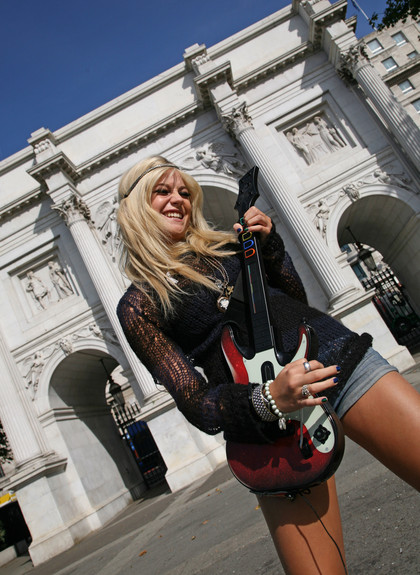Interview: Guitar Hero CEO, Dan Rosensweig
Activision's music man on the future of its golden goose
TR: What about the future of the technology? Where is that heading? There's been talk recently [from Activision CEO, Bobby Kotick] of direct-to-TV games. And how might new motion control tech like Microsoft's Project Natal be incorporated into future games?
DR: The more ubiquitous gaming becomes, the more places that people want to play it, the more places we want to be. As technology gets cheaper and more interesting – take, for example, something like Project Natal, you can imagine a series of different ways that it might be fun to add that kind of capability to music genre games. So yeah, we are working with Microsoft on that. We think that's exciting. And we are working with all the first-party vendors on all the new technologies, because each first party offers something unique.

If you take the Nintendo Wii, for example, the Wii review of Guitar Hero 5 was the best review we have ever got, which was a 93 – which makes us the highest rated third-party game ever for the Wii. And this is because we built in a game called Roadie Battle – a whole new game inside a game. Which allows those that have the Wii and the DS to connect to each other and have a battle of your roadies as somebody else is trying to play the game. So you can knock down the amps, set fire to your opponents guitar and so on. So every time there is new technology and new capability, we really do try to be amongst the first to innovate and leverage it. So Natal is something that we find particularly intriguing.
TR: And the direct-to-TV stuff? Surely the first-party console manufacturers are going to fight that and say 'we would rather you didn't cut out our console from Guitar Hero'?
DR: Well, we're not in the fighting business. We're in the game playing business. I think what we need to do is to be where our fans want to play. So we intend to be really positive and great partners of the console players and we have terrific relationships with them now. The experience of the games are great and each console has the ability to create unique experiences within the game. But if the capability allows for the expansion of Guitar Hero beyond the console, then of course we will go there, if that is where our fans want to play the game. Whether that be direct to the television or on mobile devices, we of course are always looking for ways to create experiences that our fans would really like to take advantage of.
TR: What about 3D gaming technology? That's another tech that is getting a lot of attention right now. Have you done any testing with that?
DR: Yes. Our studios see everything first, because obviously we have some of the best studios in the world. In our case, Freestyle, right here in London, who built DJ Hero and Neversoft, the king of building Guitar Hero and Band Hero and Vicarious Visions who build our games for mobile devices and for the Wii platform. So we see all new technologies.
Get daily insight, inspiration and deals in your inbox
Sign up for breaking news, reviews, opinion, top tech deals, and more.
And I think one thing that we don't want to do is to add any complexity to a game that is just so brilliant in its simplicity. So wherever we think the technology is additive, then we try to add it to the game. Wherever we think it is 'technology for technology's sake' then we stay away from it. We evaluate all the time in terms of what new technologies are available.
TR: It just strikes me that, with DJ Hero, for example, dance music culture is maybe much more visual than rock music – going to clubs and raves has always been about lighting and lots of other things, other than just playing a guitar.
DR: Yes. And I think the entire cultural experience is something that we have brought brilliantly to DJ Hero. And if there are ways to enhance it, then we, of course, will.
TR: Bill Wyman had a pop at Guitar Hero and music games in general recently, suggesting it was perhaps not for 'proper music fans'.
DR: You know, I think we should let music fans decide for themselves how they want to spend their time. Most of the comments that have been raised by a very small group of very prominent musicians – who we have the greatest admiration and respect for (I mean, I am a huge Rolling Stones fan) – I think the majority of artists find this to be a really fun way to connect to their fan-base, and to expand their fan-base and to introduce their music to newer fans.
The observation that some make is that they would really prefer it if people were taking up real instruments and taking real music lessons. And we totally understand and appreciate and support that. And it turns out that – fortunately – the more people who played Guitar Hero, the more people who actually went out and bought guitars. Or signed up for music lessons.
So although we don't teach them how to play, we allow them to have an experience about what it feels like to play. And that has led a substantial number of our fans to actually want to go and learn to play a real instrument. So we are very proud about being able to get people to get excited about music and to then take that passion in a lot of different directions, including taking guitar lessons and buying guitars.
Current page: Future tech: Direct-to-TV, Project Natal, 3D
Prev Page Beating the Beatles (Rock Band)